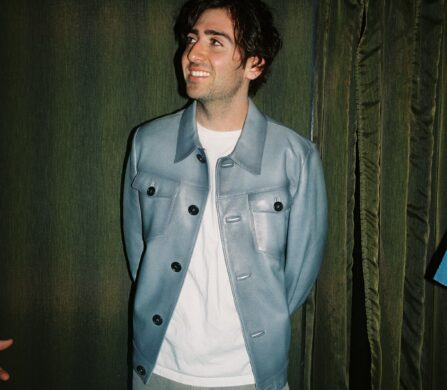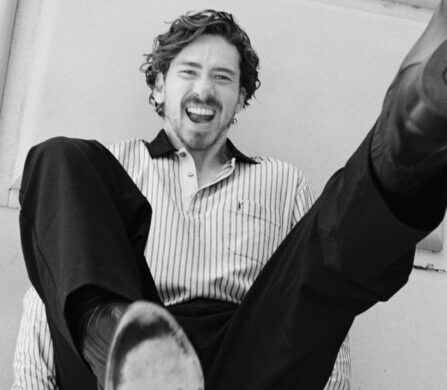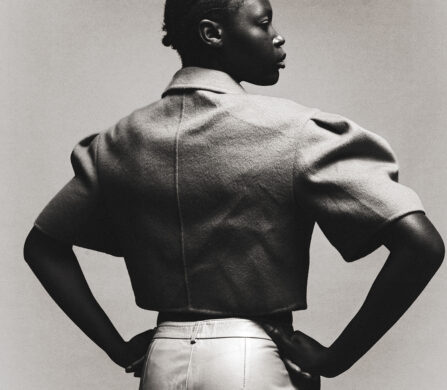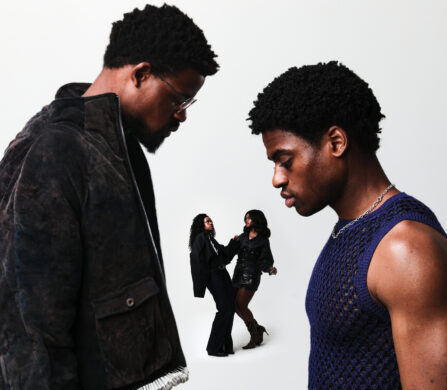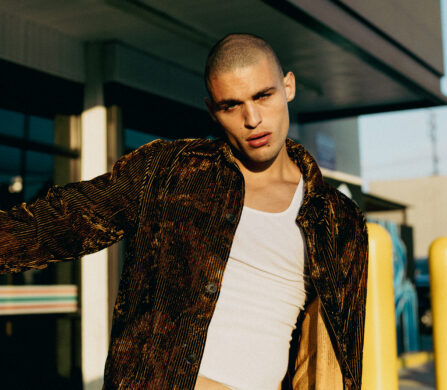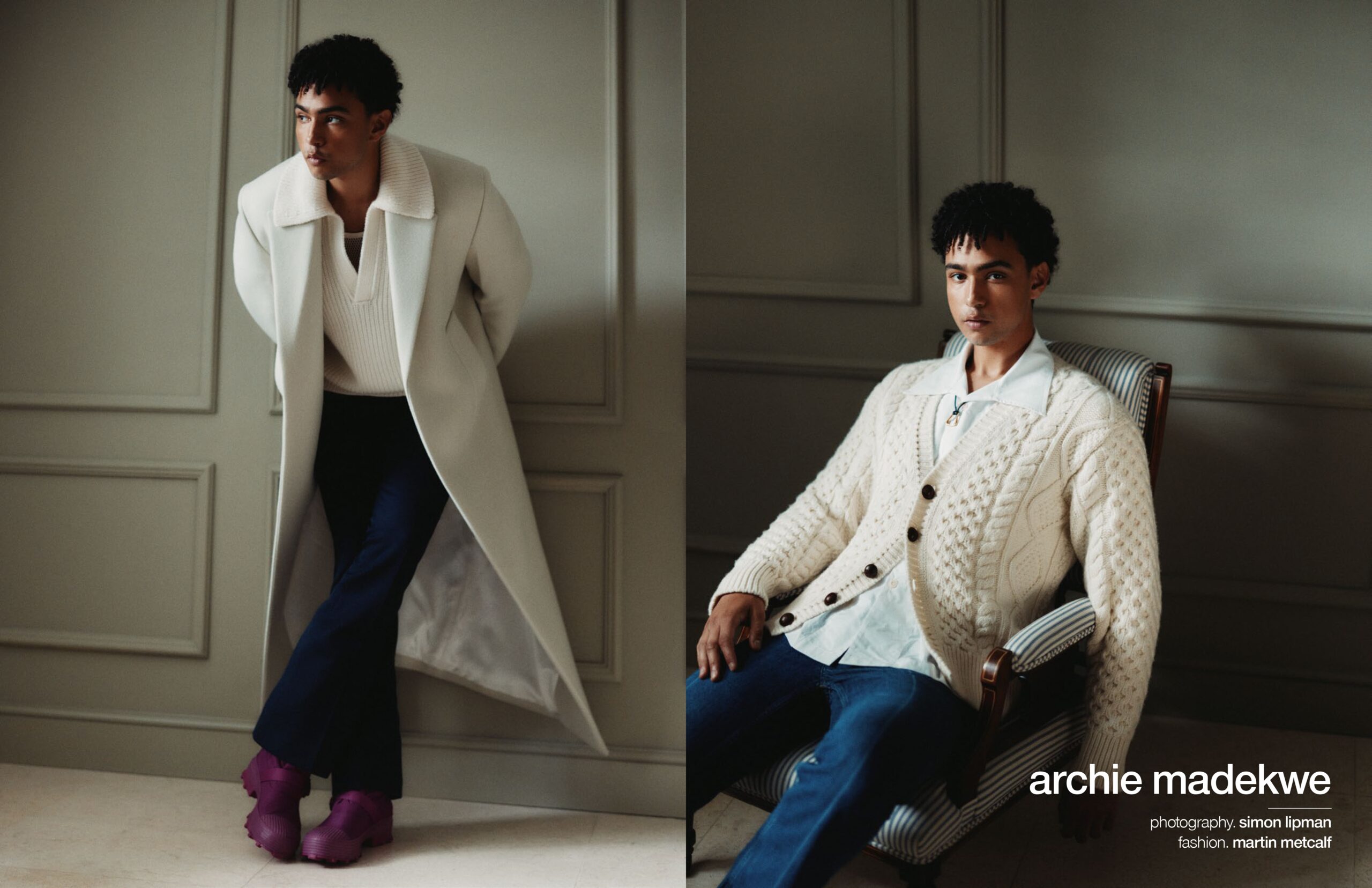
coat. Jil Sander
jumper. Bottega Veneta
vest + trousers. Ami
boots. Camperlab
opposite
cardigan. Bally
shirt. Nicholas Daley
jeans. Our Legacy
necklace. Alighieri
With Saltburn, Archie Madekwe is showing a new side to himself as an actor. The accomplished actor shares the organic path that led him to the world of make-believe and pretend, attributing his creative instincts to a childhood filled with exploration and supportive parents. To prepare for Saltburn, Archie delved into the unconventional audition process and the excitement of portraying the multifaceted character, Farleigh Start. He praises the film’s genre-defying nature, emphasizing the gut feeling he experienced upon reading the script.
Providing insight into his approach to playing Farleigh, a character described as an “impish villain with a cruel streak,” Madekwe discusses the intricacies of his preparation and the exploration of themes related to race and class. Reflecting on his training at the BRIT School and LAMDA, he underscores the significance of passion and technique in his acting career. Archie also touches on his diverse roles in TV and film, the collaborative experience with the cast of Saltburn, and the positive working environment fostered by director Emerald Fennell.
Schön! sits down with Archie Madekwe to discuss Saltburn as he hints at upcoming projects, expressing a keen interest in challenging himself with varied and unconventional roles that defy traditional norms.
How did you get involved in acting, and what inspired you to pursue a career in the entertainment industry?
It always feels a little cliché but I don’t think there was a moment where I decided like “this is what I’ll do.” I think it’s just all I’ve ever done. My cousin is an actor so I guess I saw her growing up but, even before that I was just always a kid who enjoyed being creative and that just evolved. I was lucky that I had parents that supported that. They always let me explore my interests. That allowed me to get involved with things like the National Youth Theatre or go to the BRIT School. They never discouraged me.
Can you share your experience working on Saltburn and your role as Farleigh Start? What attracted you to this character?
It was quite an unconventional audition process. I didn’t see the script until maybe my third audition. We were auditioning with monologues Emerald had written and Harold Pinter’s monologues. Zero context. So, initially, my attraction was a combination of wanting to work with Emerald and then blind intrigue. Then, when I finally had the script and I knew I was auditioning for Farleigh, it just made complete sense. I’ve never played anyone remotely close to Farleigh before so I was excited to find him and I knew I could really have fun with it. He was a really fun character to play.
Saltburn has a unique storyline. What drew you to the project, and what do you think sets it apart from other films in the same genre?
Well, I’m not even quite sure what genre you would label it. As soon as you think you’re settled into the film it moves in another direction and I loved that. That’s something I guess that’s becoming a Fennel trademark. But in terms of what drew me, it was a combination of things. There’s this hard-to-explain gut feeling that you get when you read something that you know you have to do. It’s really physical. I read it all in one sitting — I’m a slow, distracted reader so that’s always a good sign — and as soon as I finished I went back and started reading my favourite bits again.
Your character, Farleigh Start, is described as an “impish villain with a cruel streak.” How did you approach portraying such a complex character?
[Laughs] It was something to that extent and obviously when you read that you think, great, this will be fun. It also said ‘fiendishly clever’ so I immediately knew there would be a lot to unpack. What’s happening on the surface is never what’s happening underneath. And building that kind of inner life is always a fun thing. Nobody necessarily thinks of themselves as a ‘villain.’ I don’t think Farleigh is one by any means. Initially, it was just about immersing myself in their world. I didn’t grow up in boarding schools. Oxbridge was never so much as a passing thought for me. So, as soon as I knew I was doing the job, I went off to Cambridge for the day and snuck into the colleges. It was completely alien to me. Grand ballrooms, “evensong.” vast libraries. It was incredible. Just physically being in the world unlocked a lot of stuff for me.
Saltburn explores themes of race and class. How do you think your character contributes to these themes?
Farleighs on the outside looking in. In the same breath, this world does and does not belong to him. As a person of colour, and especially, as a mixed-race person — the idea of changing character depending on the room you’re in was something I knew very well. It’s something I think a lot of people of colour can relate to. The complicated feelings that surround that. Felix’s line “we don’t even notice that you’re… different,” I think sums it up beautifully.
Having attended the BRIT School and LAMDA, how did your training contribute to your acting career, and what lessons have you carried with you into your roles?
BRIT and LAMDA gave me two very different things. BRIT gave me and I think everyone that went this passion and respect for the arts that I think is priceless. It’s the thing I hold onto when you lose joy. Thanks to my experience at BRIT, I remember what this could be. LAMDA gave me technique. Drama school was described to me once as 3 years of teachers handing you different tools to put in your toolbox and over the course of your career, you’ll use your favourites and then every now and then you’ll use one you’d forgotten about, but it’s in there. That’s what LAMDA did.
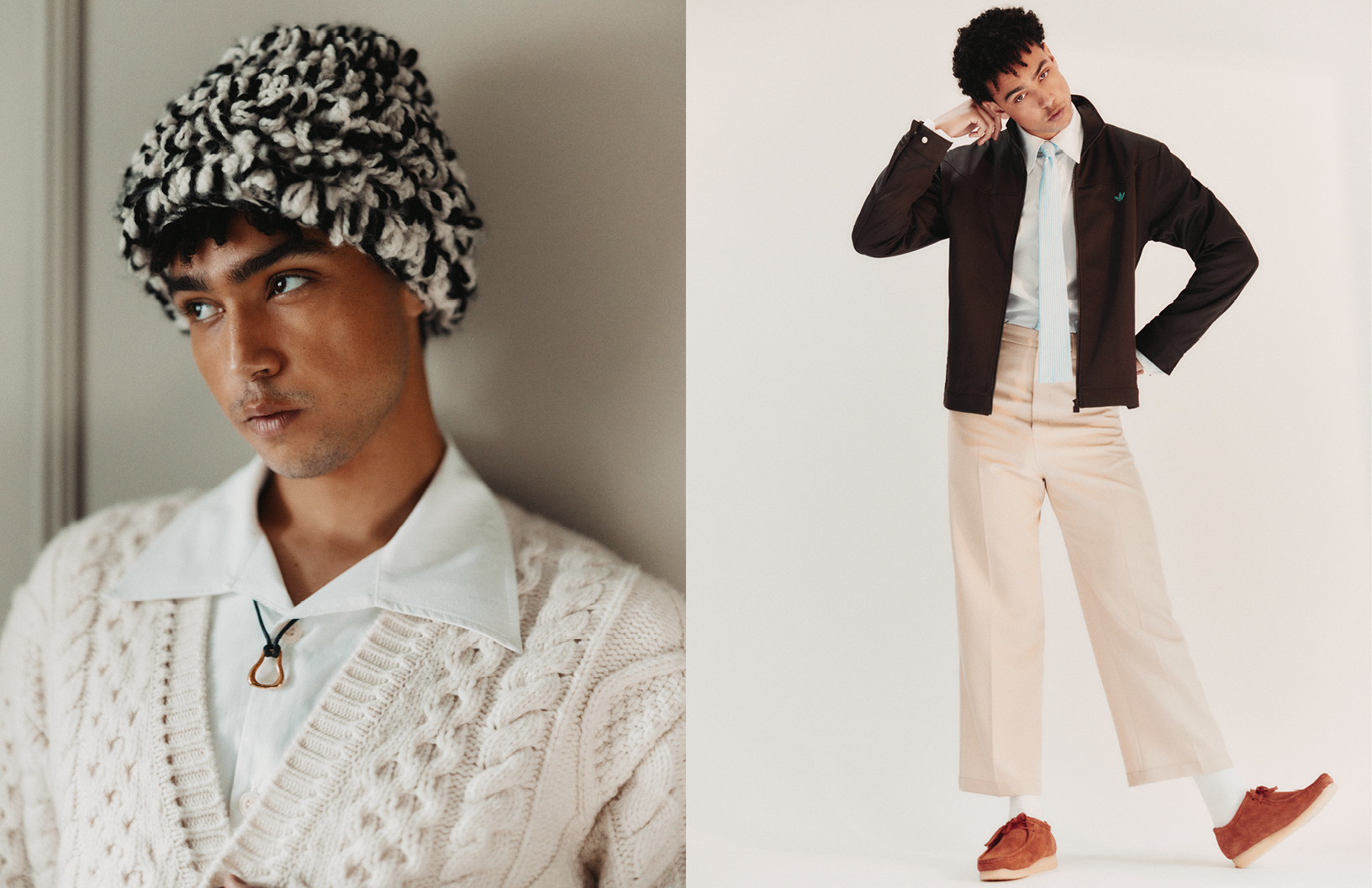
cardigan. Bally
shirt. Nicholas Daley
hat. Bode
necklace. Alighieri
opposite
jacket. Wales Bonner x Adidas
shirt. Luting Chen
trousers. Ami
shoes. Clark’s Originals
tie. Comme Des Garcons Shirt
You’ve had a diverse range of roles in TV and film. Are there specific genres or types of characters you are particularly drawn to, and why?
Not particularly. The script is king. I’ve learnt that the hard way. If it’s not on the page – it probably won’t be there on the day. But really, it’s just about finding interesting stories with complex characters. There’s no genre that’s more on or off the table. I’m open to anything really. It’s all character and world-driven. And then also filmmakers etc. That definitely feeds into it. I’ll do anything Yorgos Lanthimos or Steve McQueen are doing obviously.
Could you share any memorable moments or challenges you faced while working on the set of Saltburn?
Emerald just creates the nicest working environments. It’s something that she speaks about from day one and carries through right until the end. Nobody has star trailers. Everybody eats lunch together. She removes all the other stuff that can exist on sets and makes it entirely about the work. And the laughter! We laughed so much. Emerald let us improvise our way into scenes often and I was just in hysterics watching Rosamund and Carey. During the breakfast scene, Pamela is eating a pot of marmalade with a tiny sugar spoon throughout the entire scene and I had to actively avoid looking at her.
How do you prepare for a role, especially one as intricate as Farleigh Start? Do you have any specific acting techniques or rituals?
It feels a bit weird speaking about prep out loud! I’m not sure. Weirdly exposing. It changes from role to role. There are things you come back to or there are things that a specific character requires at the time. Music is always big. Emerald made us all a playlist for the tone of the film and I made a Saltburn playlist and then a Farleigh playlist. I smothered my trailer in photos. Things that felt like Farleigh or the Saltburn world in general. Sometimes I keep a diary as the character. I did that for Farleigh. It’s fun. But when it comes to building the character that just takes time. Lots of thought. Trial and error. Often you just find things instinctually. There are certain dynamics that exist in the film that only came out of doing.
In addition to Saltburn, you’ve been part of projects like Midsommar and See. Is there a particular role or project that holds a special place in your heart, and why?
Both of those projects are special to me because of the relationships. I walked away from both of those jobs with some of my best friends. Our experience of the film is what happens on set – once the film is out, it isn’t ours anymore. But the experience is what you hold onto. And when you’re able to walk away with real-life friends – there’s nothing better. See was special because that job lasted for years and so that cast and crew became my family. We spent Christmas together, New Year, birthdays, and Thanksgiving (for the Americans and Canadians). We still talk every week. And then we just laughed so much on Midsommar. I remember Will was reading the most interesting book during filming and on the last day he left it outside my room and had written ‘‘Archie — to a friendship for life.” They’re the moments you remember.
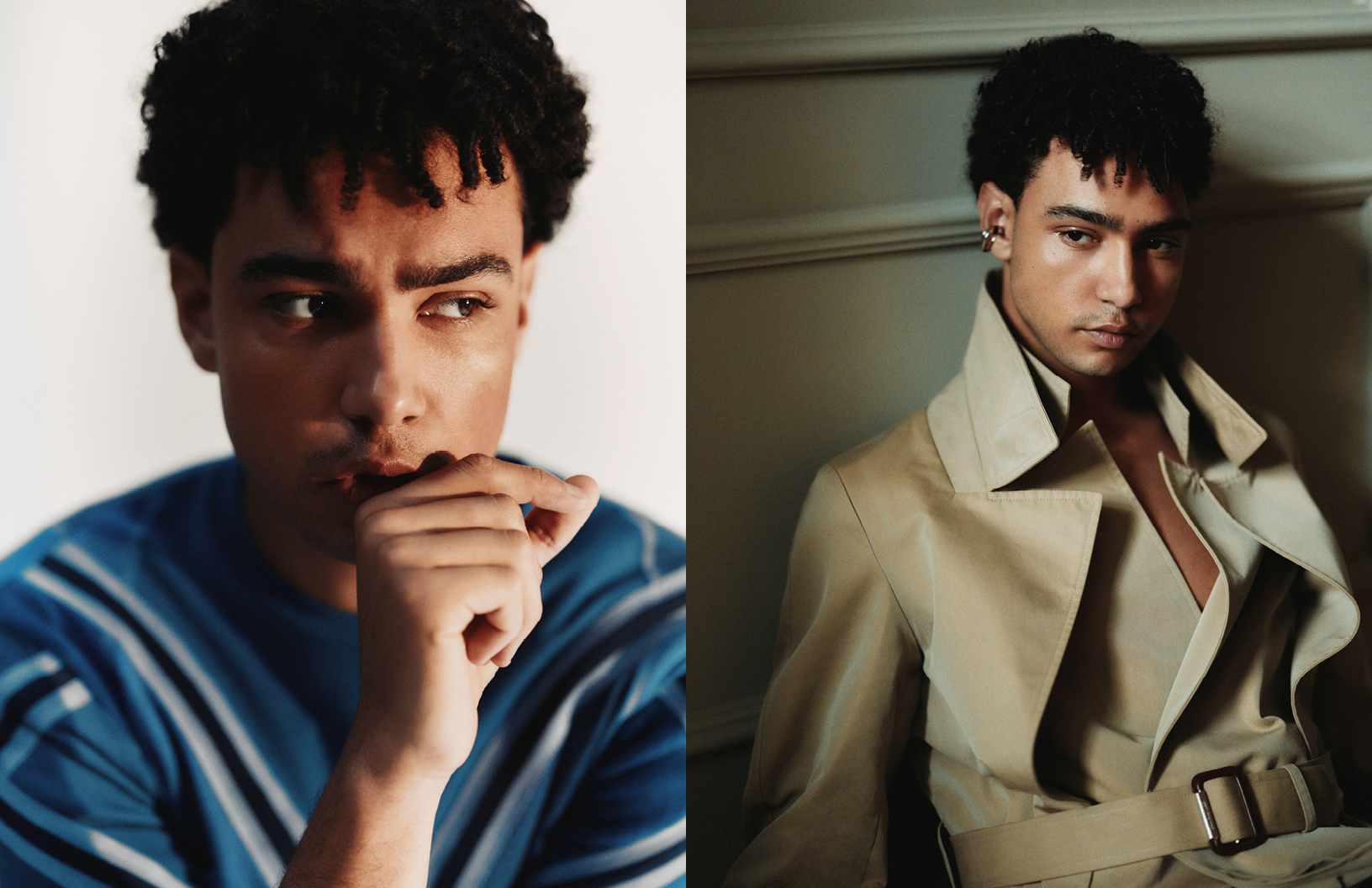
jumper. Denzil Patrick
opposite
full look. Alexander McQueen
As someone who has worked in both film and television, do you have a preference for one over the other? How do the dynamics of each medium differ for you as an actor?
No preference. It changes. They feel like different disciplines sometimes. You’re obviously given the chance to stretch a character’s journey out on TV. And that’s such a nice feeling. To grow with the character and have that connection. But there’s also something beautiful about knowing where a character’s journey begins and ends. Neither is better. TV can be hard when you don’t have all the scripts and you don’t know where the characters are going. You have to remain open. I love both though and ultimately, when it comes to the work, you treat them the same.
Saltburn features a cast with established actors like Carey Mulligan and Jacob Elordi. How was the collaborative experience with such a diverse cast?
There was a moment where I had to choose between Saltburn and a TV job and I chose Saltburn because I knew I’d walk away from it as a better actor working with a cast like this. It was just the greatest experience. Not only was I working with some of the best actors in the industry but we had the best time doing so. And because we felt so safe and respected it meant that we felt confident to try things. To improvise and trust our instincts. It’s hard to do that when you don’t feel like there’s mutual respect on set. But it was clear from day one that there were no egos and it just allowed for the most freeing and fun time.
How do you navigate social media, and how has it influenced your connection with your audience?
I really try not to take it too seriously and have fun with it but it’s easier said than done. I’d be lying if I said I didn’t really use it. I use it more than I’d like. I’d like to come off entirely… las I’m a long way away from that. I just try to share the things I think are interesting and keep my personal life to myself. It’s a fine balance but I’m trying.
Looking ahead, are there specific genres or types of roles you hope to explore in the future, and what upcoming projects can your fans look forward to?
There are a few fun things I can’t talk about yet. We’re only fresh off the strike but I’m sure I’ll be able to speak about them very soon. But looking ahead… I guess you just want to keep pushing yourself. I’m really enjoying challenging myself. Saltburn and Gran Turismo came out back to back and they couldn’t have been more different. But it was so fun to play Farleigh who is so free and extroverted to playing Jann who is the opposite entirely. I think, partly, I’m trying to play parts that I haven’t seen someone that looked like myself play before. Whether that’s a race car driver or an Oxford boarding school boy. The sky’s the limit I guess!
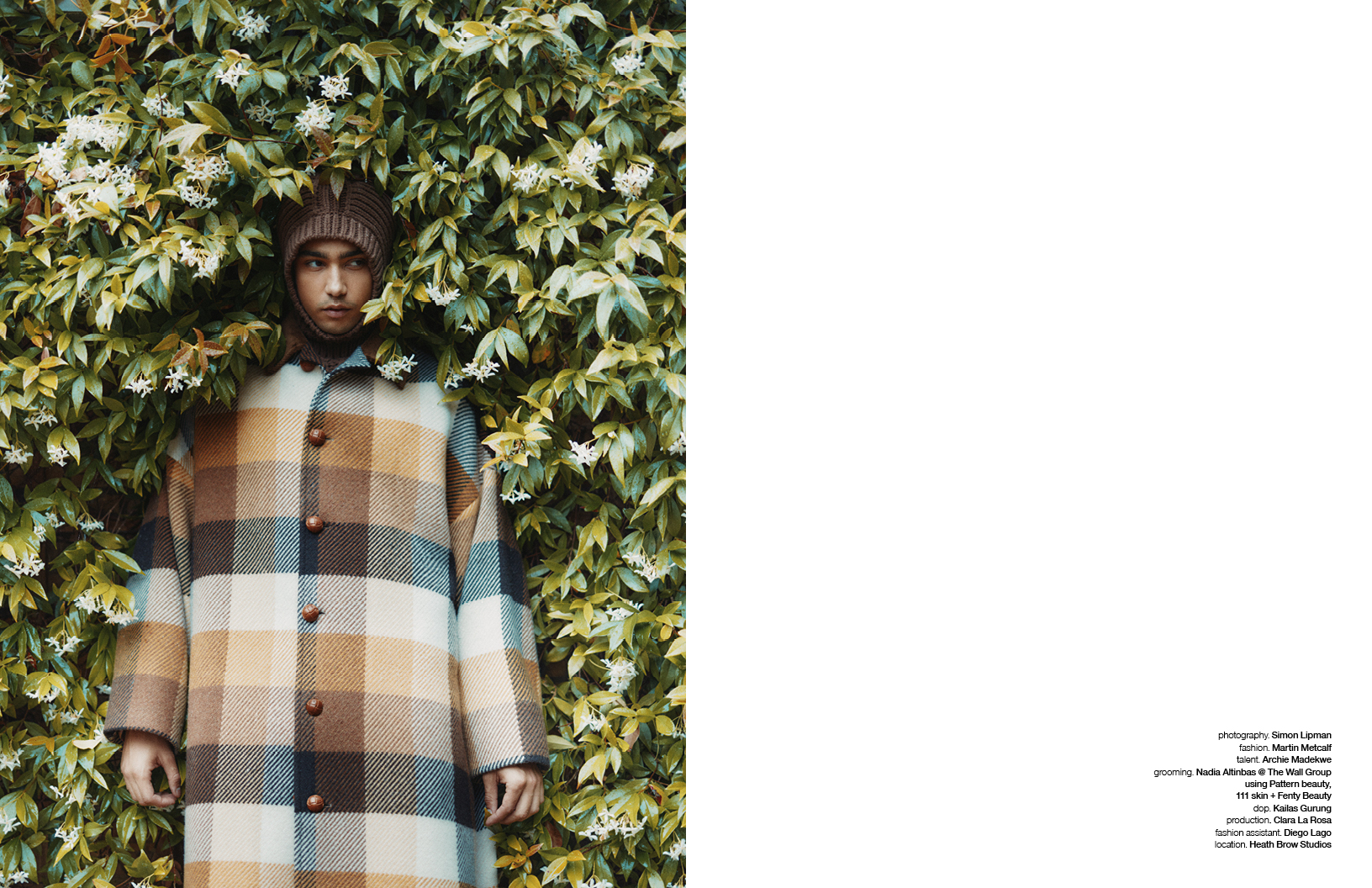
coat. Etro
jumper. Lanvin
Saltburn is in theatres now.
photography. Simon Lipman
fashion. Martin Metcalf
talent. Archie Madekwe
grooming. Nadia Altinbas @ The Wall Group using Pattern Beauty, 111 skin + Fenty Beauty
dop. Kailas Gurung
production. Clara La Rosa
fashion assistant. Diego Lago
location. Heath Brow Studios
interview. Alper Kurtel














